NCSA’s New CIP Internship Program Trains Cyberinfrastructure Professionals
December 12, 2017
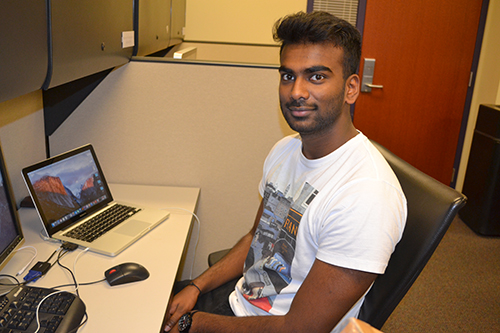
CIP intern, Vikram Mudaliar.
According to NCSA’s Daniel Lapine, the number of qualified people who have experience working in advanced cyber-infrastructure (CI) is rather limited. So over the next three years, he and some folks at NCSA hope to do something about it. As part of the NSF-funded CyberTraining CIP: NCSA Internship Program for CI Professionals, they are seeking to add to the nation’s pool of qualified, advanced cyberinfrastructure professionals.
Lapine, the project PI, along with Co-PI Volodymyr Kindratenko, says they developed the project because of “an awareness that we really lack qualified candidates when we’re searching for people to come in and fill these positions.” He’s referring to the difficulty NCSA has had finding qualified CI professionals for several job openings there.
Kindratenko agrees, admitting that their motivation in designing a project to train cyberinfrastructure professionals wasn’t completely altruistic: “Being selfish, we looked at all of the open positions at the NCSA; at that time, we had several of them, the level of system engineers, system programmers, and we had basically had difficulties finding people for these.”
After doing some research, they discovered that it wasn’t just NCSA who was experiencing a shortage, but that there was a wide-spread need nationally. On websites that list job advertisements, such as indeed.com, there was “in excess of many thousands of positions open for systems engineers, but not enough people to fill them all,” says Kindratenko.
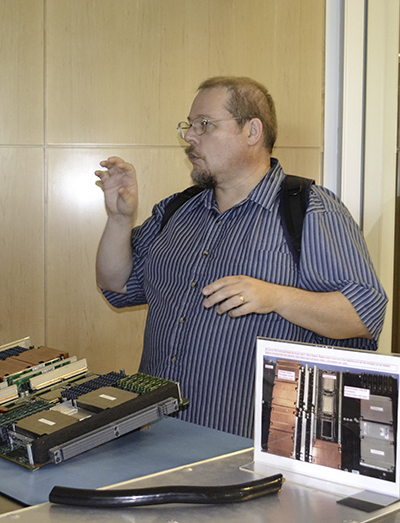
Daniel Lapine explains about Blue Waters' infrastructure during a recent Blue Waters tour he led.
Another related issue that might be contributing to the shortage? There’s a dearth of 4-year or community-college programs that focus on the operational side of cyberinfrastructure. Lapine says most 4-year college programs, for instance, address creating cyberinfrastructure applications or working on new hardware, while for community-college programs, two years of study isn’t long enough to make students effective at advanced cyberinfrastructure. “It's a good stepping stone,” he suggests, “but it's not sufficient to deal with petabytes of storage or thousands of computers or the hundred gigabit bandwidth.”
But NCSA, with its ten different cyberinfrastructure areas and its Blue Waters Super Computer, has, according to Kindratenko, “Enough of the technology to put to use together so that you expose interns to enough of the complexity.”
So, deciding to address the problem, Lapine and company sought funding from the National Science Foundation, and NCSA’s CIP project recently received $499,999 in order to provide internship opportunities. Their goal? To train a total of 30 CI professionals (five per semester) over the three years of the grant, beginning with four interns in Fall 2017.
Surprisingly, it wasn’t just applicants with computer science or computer engineering degrees who were interested in the program. While the majority of applicants had backgrounds in those two areas, students who majored in the humanities were also interested in becoming CI professionals. And following their time in the program, the interns might be qualified for some of the following positions: a network engineer, systems engineer, storage engineer, or a security engineer.
Well qualified to undertake such a training program, NCSA has ten functional operational groups that address specific areas that comprise cyberinfrastructure, each with their own unique niche, such as storage, network, security, computer architecture, etc. (see below). Each intern will be imbedded in one of these groups during their time at NCSA.
- Advanced Visualization Lab (AVL)
- Data Analysis and Visualization (DAV)
- HPC Systems Group (Systems)
- Incident Response and Security Team (IRST)
- Innovative Software and Data Analysis (ISDA)
- Innovative Technology Services (ITS)
- Integrated Data and Database Services (IDDS)
- Network Engineering (NERD)
- Science and Engineering Application Support (SEAS)
- Storage Enabling Technologies (SET)
Matching the interns with the groups was a well-thought-out process. To begin with, when applying, fall 2017 applicants were asked which groups they wouldn’t want to work with. Then interns were selected based on having one person per group. (While CIP leadership are aware that prospective interns might change their minds once they learn more about the different groups, their goal, if at all possible, is to recruit five people each semester, whose focus, at the onset, is on five different groups.)
Then, for the first couple of weeks in fall 2017, each intern spent a day in each of the different groups in order to get an idea of what each group does. Lapine then collected each of the interns’ first and second choices. Plus, he sought to give the groups a say in whether or not they thought a person would be successful with them, so the groups also got to pick their first and second choices. Lapine indicates that he was able to match first choice for three of the interns (and the groups) and second choice for the fourth intern.
In addition to providing more trained CI professionals, the project is also seeking to increase the number of underrepresented minorities in CI. They’ve been reaching out to minority-serving institutions and trying to ensure that persons from underrepresented groups who would qualify are given a chance to apply. Among the fall 2017 group of interns are three Asians and one Caucasian female.
While Lapine’s goal is to train more CI professionals to “create a pool of more talented people,” he recognizes that CIP alone will not be able to meet the need:
“We also realized that what we’re doing has to go to other institutions or organizations that have similar capabilities, or it won’t be very effective.” The idea is to disseminate the information, techniques, and processes they’re developing in the hopes that other national super-computer centers might pick up the baton, saying, “We could start a program and use these techniques and methods to help train some people with the capabilities that we have."
While Lapine acknowledges that NCSA is fortunate to have ten operational groups they can call on, he knows most centers won’t necessarily have that many distinct areas, but knows that most will have personnel focused on systems, security, networking, and probably storage. “Even just being able to bring a few people in at every center would make the program more effective,” he says.
So, with this in mind, CIP is also developing instructional materials for dissemination. Each semester, NCSA groups will be asked to produce a one-hour presentation on a topic of interest or of use to them. Thus, by the end of the project, they will have amassed quite a number of CI-related training presentations. And they’ve made a start. “The networking group produced a really nice, one-hour presentation on how the internet works at a deep networking level,” adding that it was “quite interesting to observe the presentation because I learned a lot about things that I normally would not need to know but were very useful in knowing,” Lapine reports.
Intrigued by the wealth of knowledge to be gained through the program, the first batch of interns say they’ve been learning a lot. For instance, Vikram Mudaliar got involved with CIP because he thought “there was a unique learning opportunity associated with the program. It is something that hasn't been taught or done during my undergrad college career. It was interesting to touch upon topics where you're dealing with high-performing computers and what infrastructure is needed to support these applications and computer systems.”
Mudaliar believes “collaboration between many different teams to solve one problem” is one thing he’s learned so far that will be of import later on in his career. “I think there’s a lot of cross collaboration,” he adds. “Therefore, in order to solve a problem, you need to have knowledge in different aspects of it and not necessarily just in one aspect.”
And during his internship, in order to solve a common bug on a website, he’s had to “talk to lot of other people and learn about how they would look at the solution to the problem from different aspects. That is, I think, a very important thing to take away from this internship program,” he admits.
Another intern, Katherine Koch, whose background was mostly in math, got involved in CIP because she was interested in the many areas of research being done at NCSA. Because she doesn’t have a technical background, she hoped to “learn skills that would enable [her] to participate and contribute to that interdisciplinary environment because there are so many different areas of study that are involved or that are supported by the NCSA.”
Koch trained with NCSA’s data analysis visualization group, which helps scientists uncover aspects not apparent in their data without visualization. One skill she has learned that she feels will be beneficial in the future is to determine how people of different disciplines work together to accomplish a task and what she would need to learn in order to contribute.
“I think there are very specific technical aspects of the work I’m doing that I’m learning about,” she explains, “but I’m also placing all those into a framework of ‘Who does what?’ and ‘How do people work together?’ If I were to pursue a particular area, what do I need to know in order to know what to learn further? Just getting a sense of what already exists and what I would need to investigate more.”
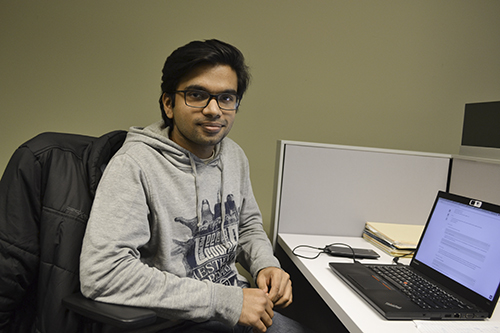
CIP intern, Pranav Baitule
Another intern, Pranav Baitule, who has a Master's degree in Telecommunications from George Mason University, has been working with NCSA’s Incident Response and Security group and hopes to eventually work in network engineering and cyber security.
Some of the skills he’s gained that he thinks he’s going to be able to apply in his career down the road include working with firewalls and time management. “So I didn't study firewalls in school, and I've been learning firewalls from scratch. That will be helpful in the future. Also I've been looking into projects simultaneously and managing the time and dividing time—time management basically—which will also be helpful in the future.”
According to Baitule, one aspect of the program that’s allowed him to do some personal networking, as well as learn a lot, is getting to work with the security team. “There's a job shadowing session for two hours each day with a different member,” he reports, “so I've gotten to learn from them, how they work daily on different projects.”
While Baitule's time here as an intern hasn’t changed his career plans—he’s been interested in networking and security from the beginning—he reports that he’s grown through the experience:
“I took certain courses during my Master’s program, and I see this as a continuation of things that I've learned in school and gained more practical experience.”
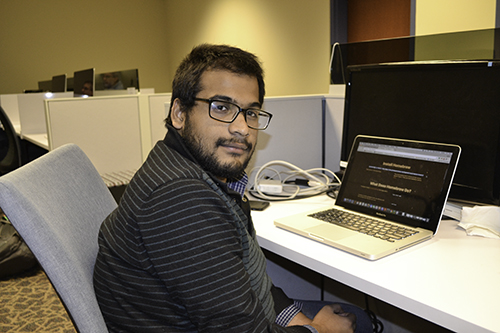
CIP intern, Yogesh Bhandari
The fourth intern, Yogesh Bhandari, got his BS in India in Power Systems Engineering, Here at Illinois, where he’s working on a Masters in Energy Systems in the Nuclear Engineering Department, but he’s also taking courses in Electrical Engineering. As part of CIP, the NCSA group he’s working with is ISDA (Innovation Software and Data Analysis), for whom he’s updating their data libraries. Bhandari hopes to go into an industry focused on energy, using software and analytics.
Regarding skills he’s acquired in CIP, Bhandari reports, “It’s very simple— it gives me the overall experience working with github workflow, more understanding in coding over python. This experience was helpful as the skills I picked during my internship are agile and modular in nature. Thus, I can use them in software development for power and energy industry."
Bhandari says participating as an intern in CIP strengthened his career goals. “So, I always wanted to go into the energy software industry,” he admits, “and with this experience, I think, down the road, I can go into that.”
Like the interns, Lapine believes the program has been going well, despite working out a few kinks. For instance, the idea was that interns work 40 hours a week to get the full opportunity to learn from other people; however, one participant, a graduate student, was limited to 20 hours a week per University rules. So for this first semester of training, they were trying to determine whether he would be able to pick up enough information for the program to be helpful.
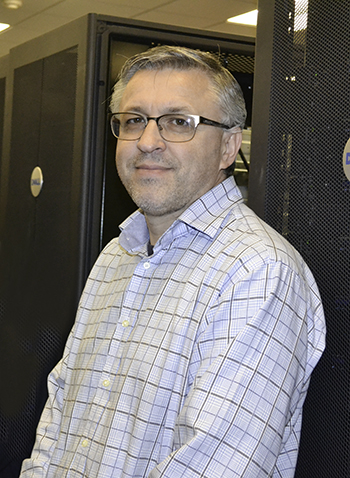
CIP Co-PI Volodymyr Kindratenko.
Lapine also stresses the notion that interns wouldn’t just be assigned tasks to do, but would be doing what he terms, “job following” or on-the-job-training. “It's not just come in and they assign you a task,” he stresses, but trainees “actually sit side saddle with someone doing work so they can understand the processes and decision making. That's the part that you can't get in a textbook.”
Regarding the job-following component, Lapine says, they’re “looking at the effect of on-the-job training in addition to the formalized training…we're trying to leverage that capability. To bring someone in who has had some training and then bring them into a real operation to give them more awareness of what happens—real-world choices and limitations. Hopefully that’s where we will get some effective skills and knowledge and activities from interns.”
So while making some adjustments to ensure that this aspect of CIP was implemented, Lapine believes the interns integrated well into the various groups. “We see activities where the students actually come up and participate in meetings. So if there's a group meeting and there's a representative, we'll see students from the different areas show up as part of the group representatives. I think we’re doing well there.”
Kindratenko sums up their hopes for CIP: “I think we are glad that the NCSA has this infrastructure—enough of the activities going on so that we can provide a really productive training environment for the interns so that they can go into the real world. We are in a good position to provide this internship program.”
Author/Photographer: Elizabeth Innes, Communications Specialist, I-STEM Education Initiative
More: Blue Waters, Career Resources, Funded Project, NCSA, 2017
For additional I-STEM web articles about NCSA, see:













.jpg)
















